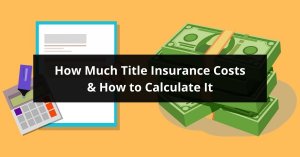The most common question we hear from home buyers outside of “Where are you located?” is regarding title insurance costs.
You may have heard title insurance costs roughly around $1,000 per policy. This is true, but you likely want a more accurate number before you begin to approach the closing table so you are not caught off guard and can make sure you’re getting a fair deal.
Luckily, getting a rough idea of how much title insurance will cost you is relatively straightforward. It’s based on the price of your property and where you are located.
But remember that there are two different types of title insurance – owners and lenders. A few factors also help to determine costs.
- Owner’s Title Insurance: Primarily based on the overall sales price of the home and its location. In most cases, it’s the more expensive policy, and this is because down payment amounts, loan amounts, and even your credit history are also figured into the policy.
- Lender’s Insurance: Solely based on the total loan amount and the state where the property is located. Less is factored into the policy, so it will almost always have a lower price than the owner’s insurance.
You can often expect title search fees to be included in the cost of your title insurance quote. This does depend on the insurance provider, but most providers will make it clear if they do. Also, if you can bundle your policies together, it’s wise to do so. Doing so can result in a reduction of the fees.
How to Calculate Title Insurance Quotes
How can you calculate it on your own? Let’s take a look at some of the details you need to be aware of.
Again, location is one of the most significant contributing factors to how much title insurance policies will cost. The good news is that each state regulates policy rates, and what you will pay with one company should closely match what you would pay with another.
However, prices will be different, and you have the right to shop around for the best rates. You should also note that you have the option to select between basic and enhanced policies.
A basic policy covers any issues that may have existed before purchasing the property. An enhanced policy protects claims or liens going forward. There should be about a 20% difference between the two.
Rates are also typically based on a sliding scale. For example, properties valued up to $250,000 may be charged $2.95 per thousand dollars, and homes above $250,000 up to $500,000 may be charged $2.65 per thousand for an owner’s insurance policy.
As property and loan values increase, you will be charged less per thousand, providing tremendous value. Exact numbers are state-specific. You will need to know what rules apply based on the state you are in.
But before heading off, you should know that a few more things should be taken into consideration. For one, you should remember a calculation is just that. It’s not a quote, only an estimate of your payment. You also need to consider any endorsements you may need to claim on your policy.
- Condo in a city: Depending on which state you are in, you may need to claim a condominium endorsement. Different endorsements exist for different types of transactions as well.
- Single-family home in the suburbs: If the property is part of a suburban HOA, you need to consider ALTA endorsement policies that protect you against any unpaid HOA fees that may exist. ALTA Endorsements 5-06 and 5.1-06 are the primary options.
- Farmhouse in the country with a barn and land: With land and existing structures, such as barns and silos, you should consider a few endorsements. In some cases, specified zoning endorsements can apply, and it’s typical for a Boundary and Easement endorsement to apply due to the size of the land.
Do keep in mind that endorsements vary by state, as do their rates. It is still important to pay attention to these claims while making calculations. It will ultimately help you produce a better estimate of what your policies will cost you.
What am I Obligated To?
As you learn about title insurance and how much it will cost, you’re going to ask whether you must have it. The answer depends on your interests and how you purchase the home.
Owner’s title insurance is never a requirement, and you do not have to pay for it if you don’t feel you truly needed.
Lender’s insurance is only required if a lender demands it. If you are purchasing a home using a loan, you can expect to pay this.
Before deciding to skip title insurance altogether, consider the benefits. Ultimately, it can save you hundreds of thousands of dollars in the long run, and it can prevent anyone from legally taking your property away from you.
Plus, you only have to pay your premium one time. Once it is paid off, you will receive coverage for the entire length of your ownership of the property.

